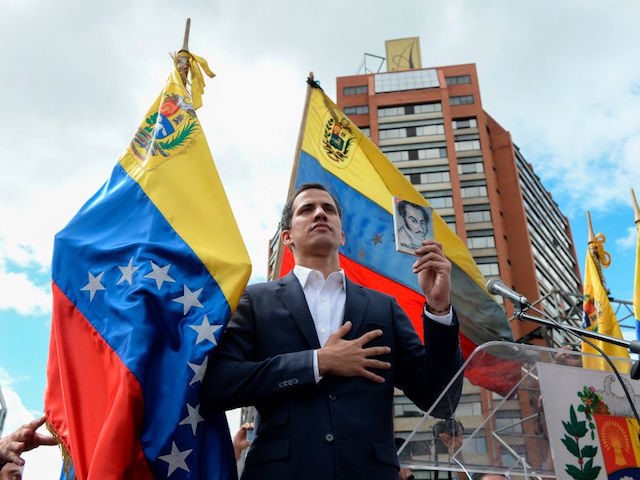Juan Guaidó, the president of the National Assembly of Venezuela, took an oath of office on Wednesday and was sworn in as the legitimate interim president of the country, replacing dictator Nicolás Maduro.
President Donald Trump issued a statement shortly after the public swearing-in ceremony recognizing Guaidó as the legitimate head of state of Venezuela. Countries like Argentina and Brazil, as well as the Organization of American States (OAS), also recognized Guaidó.
Guaidó was elected president of the National Assembly, the only remaining democratically elected institution in the country, in January. He is a member of the Popular Will party led by political prisoner Leopoldo López, a member party of the Socialist International. The United Socialist Party of Venezuela (PSUV), the party of Maduro and predecessor Hugo Chávez, is not a member of the Socialist International and the organization has publicly opposed Maduro’s dictatorship.
The National Assembly leader assumed the presidency of the country through the authority vested in Articles 333 and 350 of the constitution of Venezuela. Article 333 requires all Venezuelan citizens to “assume the duty of collaborating to reestablish the constitutional order,” while Article 350 requires Venezuelan citizens to not recognize as legitimate any “regime, legislation, or authority that defies the values, principles, and democratic guarantees [in the constitution], or that violates human rights.”
The Maduro regime has established itself through fraudulent elections and the use of force to repress dissidents, including the establishment of torture chambers in political prisons to silence dissent. Those who have survived those chambers say that electroshock, crucifixion, sleep deprivation, rape, and beatings are routine against peaceful dissidents.
Guaidó formally took his oath of office before a crowd of thousands in Caracas, who he had convened for a nationwide protest to end the “usurpation” of power by Maduro. After repeating the words in the oath, the crowd surrounding him sang the national anthem and burst into applause.
The new Venezuelan president also delivered a speech in which he promised among his first acts as president would be allowing the entry of humanitarian aid into the country, which Maduro has blocked claiming that a Western conspiracy exists to use the aid to invade and colonize the country. Maduro’s regime has also repeatedly denied the existence of any crisis despite widespread hunger and disease, the product of shortages of nearly every medicine necessary for a functional healthcare system and basic food goods.
“We authorized the entry of the humanitarian aid necessary to help our people,” he said, referring to the National Assembly. “By the way, it’s nonsense that there will be an invasion if that is allowed, it’s a tall tale. It will be managed through the Organization of American States … through the constitution.”
Shortly after his speech, President Trump issued a statement recognizing Guaidó as the country’s president.
“In its role as the only legitimate branch of government duly elected by the Venezuelan people, the National Assembly invoked the country’s constitution to declare Nicolas Maduro illegitimate, and the office of the presidency therefore vacant,” Trump said. “The people of Venezuela have courageously spoken out against Maduro and his regime and demanded freedom and the rule of law.”
“We encourage other Western Hemisphere governments to recognize National Assembly President Guaidó as the Interim President of Venezuela, and we will work constructively with them in support of his efforts to restore constitutional legitimacy,” Trump vowed. “As Interim President Guaidó noted yesterday: ‘Violence is the usurper’s weapon; we only have one clear action: to remain united and firm for a democratic and free Venezuela.’”
Vice President Mike Pence, in a video released Tuesday, addressed the Venezuelan people and hinted that Trump would no longer recognize Maduro as head of state.
“Nicolas Maduro is a dictator with no legitimate claim to power. He has never won the presidency in a free and fair election, and has maintained his grip of power by imprisoning anyone who dares to oppose him,” Pence said. “The United States joins with all freedom-loving nations in recognizing your National Assembly as the last vestige of democracy in your country, for it is the only body elected by you, the people.”
Brazil’s conservative government announced it would recognize Guaidó last week, while the nations of Argentina and Canada followed Trump’s announcement with their own recognition.
Luis Almagro, the head of the OAS, also congratulated Guaidó on becoming the nation’s president. Like Guaidó, Almagro served as an official in a leftist party in his native Uruguay before becoming one of the most outspoken international voices against the Maduro regime.
Maduro has yet to address Guaidó’s inauguration. Instead, he has posted images on Twitter of forced rallies organized by the government to distract from Wednesday’s nationwide protests.
At press time, protests against the regime continue in most of Venezuela’s largest cities. Dissidents predict a violent crackdown will occur soon, as has happened after protests from 2014 on, most likely after sundown.

COMMENTS
Please let us know if you're having issues with commenting.